山东省华侨中学2014-2015学年高一英语6月月考试题
高一6月月考英语 A卷
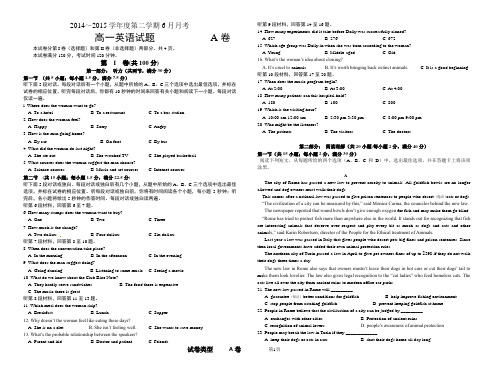
2014~2015学年度第二学期6月月考高一英语试题A卷本试卷分第I卷(选择题)和第II卷(非选择题)两部分。
共4页。
本试卷满分120分,考试时间120分钟。
第I 卷(共100分)第一部分:听力(共两节,满分30分)第一节(共5小题;每小题1.5分,满分7.5分)听下面5段对话。
每段对话后有一个小题,从题中所给的A、B、C三个选项中选出最佳选项,并标在试卷的相应位置。
听完每段对话后,你都有10秒钟的时间来回答有关小题和阅读下一小题。
每段对话仅读一遍。
l. Where does the woman want to go?A. To a hotel.B. To a restaurant.C. To a bus station.2. How does the woman feel?A. Happy.B. Sorry.C. Angry.3. How is the man going home?A. By car.B. On foot.C. By bus.4. What did the woman do last night?A. She ate out.B. She watched TV.C. She played basketball.5. What courses does the woman suggest the man choose?A. Science courses.B. Music and art courses.C. Internet courses.第二节(共15小题;每小题1.5分,满分22.5分)听下面5段对话或独白。
每段对话或独白后有几个小题,从题中所给的A、B、C三个选项中选出最佳选项,并标在试卷的相应位置。
听每段对话或独白前,你将有时间阅读各个小题,每小题5秒钟;听完后,各小题将给出5秒钟的作答时间。
每段对话或独白读两遍。
听第6段材料,回答第6至7题。
6. How many stamps does the woman want to buy?A. One.B. Two.C. Three.7. How much is the change?A. Two dollars.B. Four dollars.C. Six dollars.听第7段材料,回答第8至10题。
山东省华侨中学2014-2015学年高一英语寒假作业6 新人教版
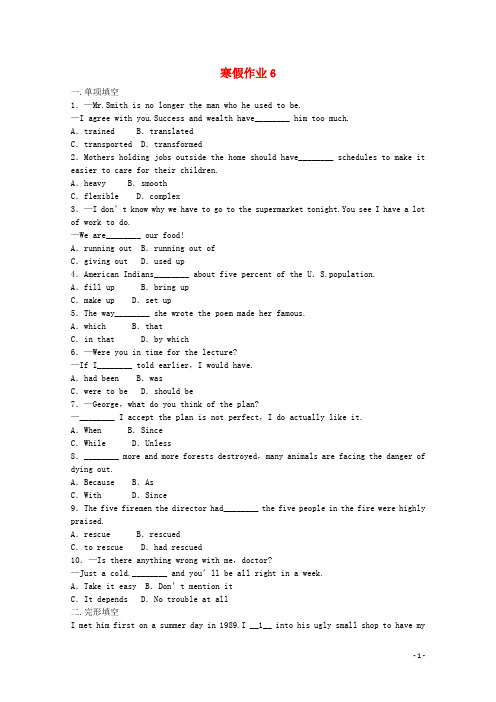
寒假作业6一.单项填空1.—Mr.Smith is no longer the man who he used to be.—I agree with you.Success and wealth have________ him too much.A.trained B.translatedC.transported D.transformed2.Mothers holding jobs outside the home should have________ schedules to make it easier to care for their children.A.heavy B.smoothC.flexible D.complex3.—I don’t know why we have to go to the supermarket tonight.You see I have a lot of work to do.—We are________ our food!A.running out B.running out ofC.giving out D.used up4.American Indians________ about five percent of the U.S.population.A.fill up B.bring upC.make up D.set up5.The way________ she wrote the poem made her famous.A.which B.thatC.in that D.by which6.—Were you in time for the lecture?—If I________ told earlier,I would have.A.had been B.wasC.were to be D.should be7.—George,what do you think of the plan?—________ I accept the plan is not perfect,I do actually like it.A.When B.SinceC.While D.Unless8.________ more and more forests destroyed,many animals are facing the danger of dying out.A.Because B.AsC.With D.Since9.The five firemen the director had________ the five people in the fire were highly praised.A.rescue B.rescuedC.to rescue D.had rescued10.—Is there anything wrong with me,doctor?—Just a cold.________ and you’ll be all right in a week.A.Take it easy B.Don’t mention itC.It depends D.No trouble at all二.完形填空I met him first on a summer day in 1989.I __1__ into his ugly small shop to have myshoes repaired.It wasn’t much of a job,so I __2__ while he did it.He greeted me with a __3__ smile,“You are __4__ in this place,aren’t you?”I said I was.I had __5__ into this street only a week before.“This is a fine place,” he said.I __6__ there with my shoes off,__7__ around as he got ready to make repairs.He looked __8__ at the leather.It was worn through because I had __9__ to have the repair job done.I grew __10__ impatient,for I was eager to meet a friend,and I had to get there w ithout delay.“Please hurry,” I begged. He looked at me __11__ his glasses,“We won’t be long.I must do a good job.You see,I have a tradition to live up to.”A tradition?In this ugly small shop that wasn’t __12__ any from so many other shops on the streets of New York.He must have felt my __13__ for he smiled as he __14__,“Yes,my father is a good shoemaker.” He always told me,“Son,do the best job on every shoe that __15__ the shop,and be proud of your own work.Do that always,and you’ll have both happiness an d money enough to live on.”As he __16__ me the finished shoes,he said,“These will last a long time.” I left __17__,my friend would be waiting for me __18__.That evening I __19__ the shop.There he was.When he saw me,he waved and smiled.This was the beginning of our __20__ that came to mean more and more to me as time passed. 1.A.looked B.rushed C.slipped D.broke2.A.left B.waited C.watched D.helped3.A.sweet B.light C.cold D.forced4.A.fresh B.young C.familiar D.new5.A.came B.lived C.moved D.entered6.A.stood B.lay C.sat D.talked7.A.thinking B.moving C.turning D.looking8.A.surprisingly B.sadly C.painfully D.angrily9.A.failed B.managed C.wanted D.intended10.A.more B.less C.greatly D.a little11.A.under B.over C.in D.with12.A.different B.special C.particular D.unusual13.A.doubt B.surprise C.disappointment D.astonishment14.A.said B.agreed C.continued D.answered15.A.flies into B.brings to C.comes into D.introduces to16.A.showed B.handed C.brought D.took17.A.quietly B.slowly C.in time D.in a hurry18.A.coldly B.happily C.anxiously D.angrily19.A.entered B.passed C.visited D.saw20.A.experience B.love C.friendship D.Story【答案解析】寒假作业6一单项填空1.D [句意为:——史密斯先生不再是过去的样子了。
高一英语月考试题及答案-华侨中学2015-2016学年高一上学期开学考试

山东省华侨中学新高一开学检测英语第一部分英语知识运用(共三节,满分30分)第一节词语释义(共5小题,每小题1分,满分5分)选出与句中划线部分意义最接近的解释,并将其字母代号填入答题卷相应空格内。
21. The boy always has many strange ideas on making up stories.A. skillsB. answersC. opinionsD. decisions22. Jenny lives next to me. She often comes to my house and plays games with me.A. likes meB. is my cousinC. misses meD. is my neighbor23. Don’t talk to your father l ike that, or you will get in his hair.A. make him angryB. touch his headC. make him happyD. give him a surprise24. The boy feels sick of practicing playing the piano. He wants to stop and play soccer with other boys.A. startsB. hatesC. finishesD. continues25. My mother always says, “If you want to have a bed of roses in the future, you should study hard.”A. live longerB. plant many rosesC. keep healthyD. live a happy life第二节单项填空(共15小题,每小题1分,满分15分)从A、B、C、D四个选项中选出能填入空白处的正确答案,并将其字母代号填入答题卷相应空格内。
2014年高一月考英语试卷

2014—2015学年度第一学期高一月考英语试卷本试卷分第Ⅰ卷(选择题)和第Ⅱ卷(非选择题)两部分。
考试结束,将试题卷和答题卡一并交回。
第Ⅰ卷注意事项:1.答第Ⅰ卷时,考生务必将自己的姓名、准考证号填写在答题卡上。
2. 选出每小题答案后,用2B铅笔把答题卡上对应题目的答案标号涂黑,如需改动,用橡皮擦干净后,再选涂其他答案标号框。
不能答在试卷上,否则无效。
第一部分阅读理解(共两节,满分40分)第一节(共15小题:每小题2分,满分30分)阅读下列短文,从每题所给的四个选项(A、B、C和D)中。
选出最佳选项,并在答题卡上将该项涂黑。
APeople need to relax and enjoy themse1ves.One way they can have a good time is to watch a baseball game or another sports event.Even thousands of years ago,groups of people gathered to watch skilled athletes(运动员).Over 2000 years ago in Greece,certain days in the year were festival days.These were holidays when people stopped work and enjoyed themselves.They liked to watch athletes take part in races and other games of skill.The most important festival was held every four years at the town of Olympia.It was held in honor of the Greek god Zeus(Zus).For five days,athletes from all parts of the Greek world took part in the Olympic Games.At the Olympic Games,people could watch them box,run,jump and so on.There was a relay race between two teams of men in which a lighted torch(火矩)was passed from runner to runner.The Olympic Games were thought to be so important that cities which were at war with one another had to stop fighting.People were allowed to travel to the games safely.Thousands of people came to Olympia from cities in Greece and from her colonies (殖民地)in Africa,Asia and Italy.They met as friends to cheer their favorite athletes and to enjoy themselves.1.What happened in Greece over 2000 years ago?A.People stopped work and enjoyed themselves.B.The cities there were often against one another.C.People watched baseball games.D.People didn‟t go to any games at all.2.What were those countries in Africa?A.Friends.B.Enemies.C.Colonies.D.Other cities.3.What did people do at the games?A.They fought.B.They just talked to friends.C.They cheered for good athletes.D.They tried to find friends.4.The best title for the story is“_____”.A.Greece at War B.Together for the Games C.Stop Fighting D.SportBThat year,in the local school,there was a new math teacher,as well as some new pupils.One of the new kids was the stupidest child anyone had ever seen.It made no difference how quickly or how slowly they tried explaining numbers to him;he would always end up saying something enormously stupid.Like two plus two was five,seven times three was twenty-seven,or a triangle had thirty corners...Before this boy arrived,math lessons had been the most boring of all.Now they were great fun.Encouraged by the new teacher,the children would listen to the pieces of nonsense spouted by the new kid,and they would have to correct his mistakes.Whenever the new teacher asked questions,the stupid kid would stand up but made the wrong answers,the other students all wanted to be the first to find his mistakes,and then think up the most original ways to explain them.To do this they used all kinds of stuff:sweets,playing cards,oranges,paper planes,etc.It didn't seem like any of this bothered the new kid.However,little Lewis was sure that it was bound to make him feel sad inside.Lewis was sure he would see him crying.So,one day,he decided to follow the new kid home after school.On leaving school,the new kid walked a few minutes to a local park,and there he waited for a while,until someone came along to meet him...It was the new teacher!The teacher gave the new kid a hug,and off they went,hand in hand.Following from a distance,Lewis could hear they were talking about math.5.The math lessons became interesting because of the new teacher's___.A.creativity B.imagination C.responsibility D.curiosity6.The passage implies that the stupidest child__________.A.was in great need of math teacher's help after classB.was by no means slow in math C.had no gift for math and was slow to learn itD.disliked both the new math teacher and his lessons7.According to the passage,Lewis followed the stupid kid in order to____.A.learn about where he lived B.find out if he felt upsetC.say something to comfort him D.make friends with him8.What does the underlined word“this”in the third paragraph refer to?A.To find the new kid's mistakes. B.To think up the most original ways to explain.C.To use all kinds of stuff. D.To follow him home after school.CAre you looking for some new and exciting places to take your kids to? Try some of these places:●Visit art museums. They offer a variety of activities to excite your kids' interest. Many offer workshops for making hand-made pieces, traveling exhibits, book signings(签名) by children's favorite writers, and even musical performances and other arts.●Head to a natural history museum. This is where kids can discover the past from dinosaur models to rock collections and pictures of stars in the sky. Also, ask what kind of workshops and educational programs are prepared for kids and any special events that are coming up.●Go to a Youtheater. Look for one in your area offering plays for child and family visitors. Pre-show play shops are conducted by area artists and educators where kids can discover the secret about performing arts. Puppet (木偶) making and stage make-up are just a couple of the special offerings you might find.●Try handson_science. Visit one of the many handson science museums around the country. These science play-lands are great fun for kids and grown-ups alike. They'll keep your child mentally and physically active the whole day through while pushing buttons, experimenting, and building. When everyone is tired, enjoy a fun family science show, commonly found in these museums.9.If a child is interested in the universe, he probably will visit ________.A.a Youtheater B.an art museumC.a natural history museum D.a hands-on science museum10.What can kids do at a Youtheater?A.Look at rock collections. B.See dinosaur models.C.Watch puppet making. D.Give performances.11.What does“handson science”mean in the last paragraph?A.Science games designed by kids. B.Learning science by doing things.C.A show of kids' science work. D.Reading science books.12.Where does this text probably come from?A.A science textbook. B.A tourist map.C.A museum guide. D.A news report.DTOKYO—At first glance, Japanese cellphones are the young's dream: ready for Internet and e-mail, they double as credit cards, and even body-fat calculators (计算器). However, despite years of competition in overseas markets, Japan's cellphone makers have little presence beyond the country's shores. “Japan is years ahead in any innovation. But it hasn't been able to get business out of it,”said Gerhard Fasol, president of the Tokyo-based IT consulting firm, Eurotechnology Japan.This year, Mr Natsuno, who developed a popular wireless Internet service called i-Mode, invited some of the best minds in the field to debate how Japanese cellphones can go global.Yet Japan's lack of global influence is all the more surprising because its cellphones set the pace in almost every industry innovation: e-mail capabilities in 1999, camera phones in 2000, third-generation networks in 2001, full music downloads in 2002, electronic payments in 2004 anddigital TV in 2005. “The most amazing thing about Japan is that even the average person out there will have a superadvanced phone,” said Mr Natsuno. “So we're asking, can't Japan build on that advantage?”Japan has 100 million users of advanced third-generation smart phones, twice the number used in the United States, a much larger market. Many Japanese rely on their phones, not a PC, for Internet access.Indeed, Japanese makers thought they had positioned themselves to dominate the age of digital data. But Japanese cellphone makers were a little too clever. In the 1990s, they set a standard for the second-generation network that was refused everywhere else. Then Japan quickly adopted a third-generation standard in 2001. However, it made Japanese phones too advanced for most markets.At a recent meeting of Mr Natsuno's group, the discussion turned to the cellphones themselves. Despite their advanced hardware, they often have ugly interfaces (界面), some participants said.“Because each cellphone model is designed with a customized user interface, development is time-consuming and expensive,”said Tetsuzo Matsumoto, senior executive vice president. “Japan's phones are all …handmade‟ from scratch,” he said. “That's__reaching__the__limit.”13. Why were Japanese cellphone makers a little too clever?A. Because their technical standards couldn't be accepted in overseas markets.B. Because they didn't want to improve their products.C. Because they used second-generation network earlier than others.D. Because their phones couldn't be connected to PC.14. What's the disadvantage of Japanese cellphones?A. Their interfaces fall behind the fashion.B. They are too expensive.C. They are always out of order.D. Their hardware can't keep up with the development.15. What does the underlined sentence in the last paragraph mean?A. Japan's phones have too many functions.B. Japan's phones can't continue their history any longer.C. Japan's phones have been developed far enough.D. Japan's phones have been out of state.第二节(共5小题;每小题2分,满分10分)根据根据短文内容,从短文后的选项中选出能坡入空白处的最佳选项。
高中英语真题-2014-2015学年高一下学期第一次月考英语试题
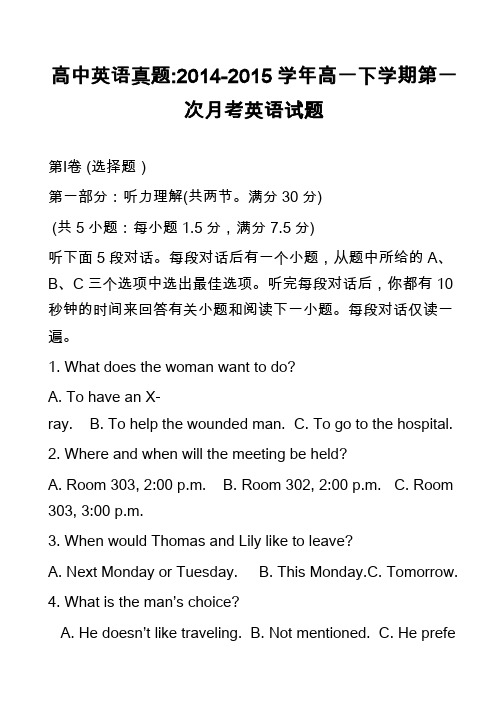
高中英语真题:2014-2015学年高一下学期第一次月考英语试题第Ⅰ卷 (选择题)第一部分:听力理解(共两节。
满分30分)(共5小题:每小题1.5分,满分7.5分)听下面5段对话。
每段对话后有一个小题,从题中所给的A、B、C三个选项中选出最佳选项。
听完每段对话后,你都有10秒钟的时间来回答有关小题和阅读下一小题。
每段对话仅读一遍。
1. What does the woman want to do?A. To have an X-ray. B. To help the wounded man. C. To go to the hospital.2. Where and when will the meeting be held?A. Room 303, 2:00 p.m.B. Room 302, 2:00 p.m.C. Room 303, 3:00 p.m.3. When would Thomas and Lily like to leave?A. Next Monday or Tuesday.B. This Monday.C. Tomorrow.4. What is the man’s choice?A. He doesn’t like traveling.B. Not mentioned.C. He prefers trains for trip.5. According to the man, what should the woman do at first?A. She should read the advertisements for flats in the newspa per.B. She should phone and make an appointment.C. She should ask about the flat on the phone.第二节(共15小题;每小题1.5分,共22.5分)听下面5段对话或独白。
高中英语真题-2014~2015学年第二学期高一年级6月考试
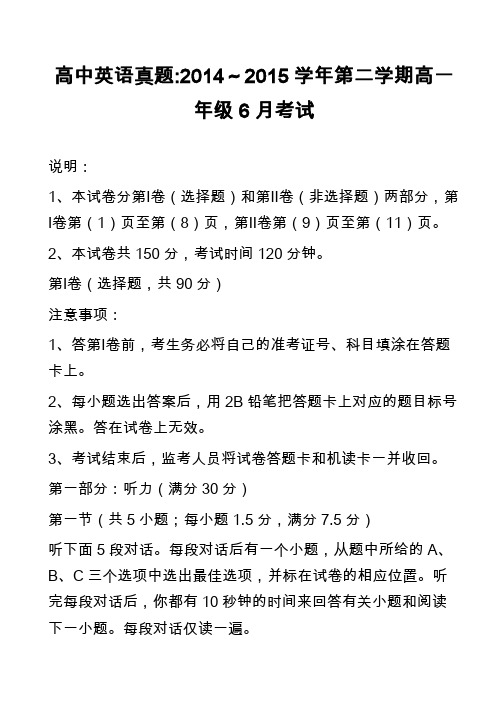
高中英语真题:2014~2015学年第二学期高一年级6月考试说明:1、本试卷分第Ⅰ卷(选择题)和第Ⅱ卷(非选择题)两部分,第Ⅰ卷第(1)页至第(8)页,第Ⅱ卷第(9)页至第(11)页。
2、本试卷共150分,考试时间120分钟。
第Ⅰ卷(选择题,共90分)注意事项:1、答第Ⅰ卷前,考生务必将自己的准考证号、科目填涂在答题卡上。
2、每小题选出答案后,用2B铅笔把答题卡上对应的题目标号涂黑。
答在试卷上无效。
3、考试结束后,监考人员将试卷答题卡和机读卡一并收回。
第一部分:听力(满分30分)第一节(共5小题;每小题1.5分,满分7.5分)听下面5段对话。
每段对话后有一个小题,从题中所给的A、B、C三个选项中选出最佳选项,并标在试卷的相应位置。
听完每段对话后,你都有10秒钟的时间来回答有关小题和阅读下一小题。
每段对话仅读一遍。
What is the date today?A. May 6th.B. May 7th.C. May 8th.What are the speakers discussing?A book by a new author.A book they have both readA book by an author they both knowWhere does the conversation probably take place?In a bankB. In a travel agencyC. At an airportHow is the woman getting along with her piano lessons? She is tired of themB. She is making progressC. She wants to give them up5. What does the man mean?Mr.Smith didn’t keep his promiseHe forgot to bring the dictionaryHe forgot to take a message for the woman第二节(共15小题;每小题1.5分,满分22.5分)听下面5短对话或独白。
山东省2014年6月普通高中学业水平(会考) 英语 试卷及答案
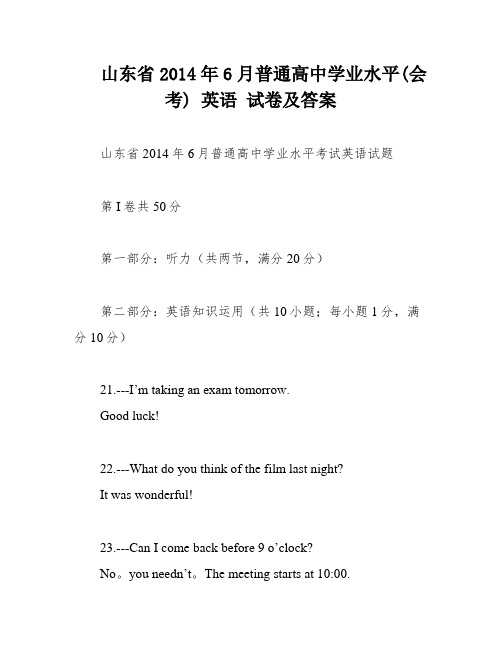
山东省2014年6月普通高中学业水平(会考) 英语试卷及答案山东省2014年6月普通高中学业水平考试英语试题第I卷共50分第一部分:听力(共两节,满分20分)第二部分:英语知识运用(共10小题;每小题1分,满分10分)21.---I’m taking an exam tomorrow.Good luck!22.---What do you think of the film last night?It was wonderful!23.---Can I come back before 9 o’clock?No。
you needn’t。
The meeting starts at 10:00.24.---Would you like some tea or orange juice?Orange juice。
please.25.May I have a talk with you。
sir。
I’ve got something important to tell you.26.From his wet coat。
I knew it was raining outside then.27.I don’t know whether John will help us。
Why not call him?28.B。
There is a notice on the wall which reads: MIND YOUR STEPS!29.A。
Whenever you have a chance to speak English。
you should take it.30.D。
---Have you ever been to the Great Wall。
---Yes。
I visited it when I was in Beijing.Part 3: Reading nAA man hated his wife's cat and decided to get rid of it。
高中英语真题-2014-2015学年度第二学期高一年段英语科

高中英语真题:2014-2015学年度第二学期高一年段英语科注意事项:考生将自己的姓名、考号(前4位)及客观题(选择题)答案均填涂在答题卡上。
将班级、姓名及班级座号(须与答题卡考号一致)填写在答题卷规定位置。
将主观题,答案填写在答题卷相应位置。
I. 听力(共两节,满分30分)做题时,先将答案划在试卷上。
录音内容结束后,你将有两分钟的时间将试卷上的答案转涂到答题卡上。
第一节(共5小题;每小题1.5分,满分7.5分)听下面5段对话。
每段对话后有一个小题,从题中所给的A、B、C三个选项中选出最佳选项,并标在试卷的相应位置。
听完每段对话后,你都有10秒钟的时间来回答有关小题和阅读下一小题。
每段对话仅读一遍。
1. What is the woman doing?A. Asking for room service.B. Booking a ticket.C. Asking about a flight.2. What’s the man’s plan for tonight?A. Go to the library.B. Go to the cinema.C. Do some reading.3. Where does the conversation take place?A. At a restaurant.B. At home.C. At a store.4. How often does the man play tennis?A. Once a week.B. Twice a week.C. Every morning.5. What was the weather like in Australia then?A. Rainy.B. Nice.C. Terrible.第二节(共15小题;每小题1.5分,满分22.5分)听下面5段对话或独白。
每段对话或独白后有几个小题,从题中所给的A、B、C三个选项中选出最佳选项,并标在试卷的相应位置。
- 1、下载文档前请自行甄别文档内容的完整性,平台不提供额外的编辑、内容补充、找答案等附加服务。
- 2、"仅部分预览"的文档,不可在线预览部分如存在完整性等问题,可反馈申请退款(可完整预览的文档不适用该条件!)。
- 3、如文档侵犯您的权益,请联系客服反馈,我们会尽快为您处理(人工客服工作时间:9:00-18:30)。
山东省华侨中学2014—2015第二学期月考(6月)高一英语试题第I卷(共90分)第一部分:听力(共两节,满分20分)第一节(共5小题;每小题1分,满分5分)听下面5段对话。
每段对话后有一个小题,从题中所给的A、B、C三个选项中选出最佳选项,并标在试卷的相应位置。
听完每段对话后,你都有10秒钟的时间来回答有关小题和阅读下一小题。
每段对话仅读一遍。
1. What will the man do on the weekend ?A. Make some plansB. Review his lessonsC. Play badminton2. What is the woman offering as a gift ?A. A washing machineB. An iPhoneC. A television3. What used to be the woman’s favorite sports ?A. Swimming and table tennisB. Skiing and baseballC. Skating and table tennis4. What did the man do yesterday ?A. He picked up his sisterB. He listened to a lectureC. He went to the hospital5. What’s the probable relationship between the speaker ?A. Mother and sonB. Husband and wifeC. Teacher and student 第二节(共15小题:每小题1分,满分15分)听第6段材料,回答第6、7题。
6. Where is the man going ?A. A supermarketB. A bookstoreC. A flower shop7. How does the woman suggest the man get there ?A. By taxiB. By busC. On foot听第7段材料,回答第8、9题。
8. What is the date today ?A. May 10thB. May 11thC. May 12th9. What will the man do at 7:30 pm on May 12th ?A. Attend a ceremonyB. Sign a contractC. Have a meeting听第8段材料,回答第10至12题。
10. What does the man’s daughter want ?A. English novelsB. Business-management booksC. Fashion magazines11. How many items will the man borrow ?A. ThreeB. FourC. Five12. Where are the books on human resources ?A. On the first floorB. On the second floorC. On the fourth floor听第9段材料,回答第13至16题。
13. When did the man go to India ?A. In 1960B. In 1965C. In 196114. What has the man not been so far ?A. A novelistB. An actorC. A movie maker15. How many novels are mentioned ?A. OneB. TwoC. Three16. Why did the man give up farming ?A. He was busy working on his novelB. He had earned enough moneyC. He got married听第10段材料,回答第17至20题。
17. Where was the man living at that time ?A. In AmericaB. In JapanC. In Germany18. What had happened to the man’s car when he came back after shopping ?A. It was not in the parking placeB. It was hanging in the airC. It was taken away by the police19. Where did the man park his car ?A. In an unusual parking placeB. At the entrance to a car parkC. At the exit to a car park20. What do the man’s friends think of the story ?A. An expensive mistakeB. SadC. Funny第二部分:阅读理解(共2节,满分40分)第一节(共15小题;每小题2分,满分30分)阅读下列短文,从每题所给的四个选项(A、B、C、D)中,选出最佳选项,并在答题卡上将该项涂黑。
AMother Teresa was born in Yugoslavia (南斯拉夫), on August 27th, 1910. She attended the government school near her home until she was 18. At that time, some doctors and nurses from Yugoslavia were working in India, and they often wrote to the school about their work. She decided to join them one day.When she finished school, she went first to Britain. Then a year later she went to India, where she began to train to be a teacher. After training, she was sent to Calcutta, where she taught geography at a school and soon after became headmasteress.However, although she loved teaching, in 1949, Mother Teresa left the school and went to work in the poor parts of Calcutta. Later she was trained to become a nurse in Patna, and then began her work helping the poor and comforting(安慰)the dying in the streets of the city. Slowly, others came to help her, and her work spread to other parts of India.Mother Teresa is now a well-known person. Many photos have been taken of as she travels the world to open new schools and hospitals in poor countries. In 1979, she was given the Nobel Peace Prize for the lifetime of love and service she has given to the poor.21. What first inspired Mother Teresa to work in India ?A Her visit to the poor parts of CalcuttaB Her visit to Britain after she left schoolC The medical workers' letters to her schoolD The work of the nurses in the city of Patna22. In which orders did Mother Teresa do the following things ?a. trained to be a nurseb. went to Indiac. helping the dyingd. studied to be a teachere. went to Britainf. worked as a headmasteressA. b. a. c. e. d. f.B. e. f. a. d. b. c.C. e. b. d. f. a. c.D.e. a. b. c. d.f.23. Mother Teresa gave up teaching because she wanted _______.A to look after the poorB to travel to the poor countriesC to build hospitals for the poorD to train nurses to care for the poor24. Mother Teresa is now famous because she has ________.A saved many poor people in IndiaB helped to bring about world peaceC helped to make India a more peaceful placeD taken care of many poor people in the worldBThe largest bird that cannot fly also happens to be the largest living bird in the world. This is the huge North African ostrich (鸵鸟). When the male is fully grown, he reaches a height of nearly eight feet and many weigh close to three hundred pounds. His wings are very small and the wing feathers are very soft, and therefore he does not fly.You have probably heard the old saying about “the foolish ostrich burying his head in the sand”. Well, the ostrich is not nearly as foolish as he is said to be. In the daytime, when the hen is sitting on the eggs, she does not want to be seen; instead of sticking her long neck up into the air, she bends (弯曲) her neck and head down. That way, she can best protect the eggs and herself.Because the ostrich cannot fly up into the air to escape from danger on the ground, he has to remain alert at all times. Luckily, he has very good eyesight and hearing, so he can stop danger in time to run away. The ostrich can run so fast that it almost seems as if he is flying.Sometimes, when a person has a small appetite (胃口), we say that he “eats like a bird”. Of course, that bird is not the ostrich! An ostrich will ea t anything under the sun. When an ostrich died in a zoo, scientists cut it open to see what he had eaten. Here are some of the things found in its stomach: three pieces of wood, partof a film roll, a French coin, four pennies, and so on.25. Ostriches bury their heads in the sand because they _____.A. are too lazy to do anythingB. can avoid being attackedC. can relax by doing soD. are very shy26. The underlined part “remain alert” in Paragraph 3 probably means “_____”.A. be sure about everythingB. be careful in flyingC. be full of energyD. be quick to act27. Which of the following enables ostriches to escape from danger in time?A. Their height and weight.B. Very good eyesight and hearing.C. The ability to fly up into the airD. A big appetiteCHow to Study Smarter, Not HarderHere are some of our favorite study tips that will help any student study smarter, not harder:Recite As You StudyReciting—saying things out loud should first take place as you read through each paragraph or section. Test yourself. This will help you to understand as well as learn faster because it is more active than reading or listening. It will also help you to notice your mistakes and the topics you have trouble understanding.Take Fuller NotesNotes should be in your own words, brief and clear. They should be tidy and easy to read. Writing notes will help you better than just underlining as you read, since it forces you to rewrite ideas in your own words.Study the MiddleThe best time to review is soon after you’ve learned something. You are more likely to remember the material at the beginning and the end of the lesson, so make sure you focus on the middle when you review.Sleep On ItStudy before going to bed, unless you are very tired. It’s easier to remember material you’ve just learned after sleeping than after an equal period of daytime activity, because your brain continues to think even after you’ve fallen asleep. Combine Memory and UnderstandingThere are two ways to remember: by memorizing and by understanding. Multiplication tables, telephone numbers, and math formulas are better learned by rote. Ideas are best learned by understanding.The more ways you have to think about an idea, the more meaning it will have; the more meaningful the learning, the better you can remember it. Pay attention to similarities in ideas and concepts, and then try to understand how they fit in with things you already know. Never be satisfied with anything less than a completely clear understanding of what you are reading. If you are not able to follow the thought, go back to the place where you first got confused and try again.28. You can notice your mistakes by _______.A. taking notesB. saying things out aloudC. studying the middleD. sleeping on it29. When taking notes, you should _______ to better help you with reading.A. write notes in your own wordsB. underline important notesC. take down every detailD. write as quickly as possible30. The writer advises you to _______ as it is easier for you to remember material.A. study after a period of activityB. do some exercise after studyingC. study before going to sleepD. study as soon as you get up31. Which of the following is NOT helpful for your understanding?A. Thinking about an idea in different ways.B. Relating ideas and concepts with what you already know.C. Going back to what first made you confused and start again.D. Reading from the beginning to the end without stop.DIt is a hot summer day,and you feel thirsty. A friend gives you a glass of cold lemonade.How do you feel when you see the glass? Will you describe your feeling as happiness or as pleasure? I believe you will say it is a feeling of pleasure.There is a connection between these two kinds of feelings,and sometimes one causes the other,but they are not the same.Pleasure is more dependent on the five senses while happiness is independent of them.When you are happy,little unpleasant events usually do not disturb you.When you are unhappy,you feel as if everything is against you.You may compensate for it by eating chocolate and sweets because this gives you pleasure;yet you stay unhappy.A person may smoke cigarettes because it gives him pleasure,yet,this does not make him happier,especially if he knows the fact that it is not good for his healthThe physical world is always in a changing state.At each moment a new thing is being created,changed,transformed and then destroyed.This is the normal state of things and no one can change it.If we stay still in a certain state,we are sure to experience unhappiness sooner or later.On the other hand,if we adjust to the environment,nothing can influence our moods.Then outer events have nothing to do with our inner joy of mind.The room of the mind was filled with worry or fear.If you are free of thinking about them, the room has been emptied,and then you will see what is happening and experience it. When your mind stays quiet,you will see that happiness comes from the inside.32.What does the underlined phrase “compensate for” in Paragraph 2 most probably mean?A.to make a suitable payment for B.to let out your anger forC.to provide with a balancing effect for D.to solve the problems for33.According to the passage, in which of the following situations can you feel happy?A.A friend gives you a glass of cold lemonade when you feel thirsty.B.You eat chocolate and sweets when you feel as if everything is against you.C.Smoke cigarettes even though you know the fact that it is not good for your health.D.You are free from worry or fear when your mind stays quiet.34.We can learn from the passage that _________ .A.happiness is more dependent on the five sensesB.pleasure sometimes arouses(引起) happinessC.you feel happy when nothing around you changes in a certain stateD.you feel unhappy because you have to adjust to the environment35.Which can be the best title for the passage?A.Pleasure Leads To Happiness B.Happiness Changes UsC.Happiness Is Within Us D.Stay A Quiet Mind第二节(共5小题;每小题2分,满分10分)根据短文内容,从短文后的选项中选出能填入空白处的最佳选项。
